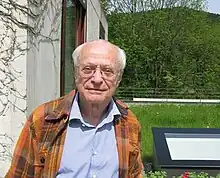
Jean-Pierre Serre
Jean-Pierre Serre (born 15 September 1926) is a French mathematician who has made contributions to algebraic topology, algebraic geometry, and algebraic number theory. He was awarded the Fields Medal in 1954, the Wolf Prize in 2000 and the inaugural Abel Prize in 2003.
Quotes
- It strikes me that mathematical writing is similar to using a language. To be understood you have to follow some grammatical rules. However, in our case, nobody has taken the trouble of writing down the grammar; we get it as a baby does from parents, by imitation of others. Some mathematicians have a good ear; some not (and some prefer the slangy expressions such as 'iff'). That's life.
- Jean-Pierre Serre in letter to David Goss, quoted in: David Goss. "Some Hints on Mathematical Style," at people.math.osu.edu, accessed 08.2016
- You see, some mathematicians have clear and far-ranging. "programs". For instance, Grothendieck had such a program for algebraic geometry; now Langlands has one for representation theory, in relation to modular forms and arithmetic. I never had such a program, not even a small size one.
Quotes about Jean-Pierre Serre
- If Serre was a Mozart, Grothendieck was a Wagner.
- Michael Artin, Allyn Jackson, David Mumford, and John Tate, Coordinating Editors (March 2016). "Alexandre Grothendieck 1928–2014, Part 1". Notices of the AMS 63 (3): 242-255.
- Je pourrais dire, en exagérant à peine, qu’entre le début des années cinquante jusque vers l’année 1966, donc pendant une quinzaine d’année, tout ce que j’ai appris en "géométrie" (dans un sens très large, englobant la géométrie algébrique ou analytique, la topologie et l’arithmétique), je l’ai appris par Serre, quand je ne l’ai pas appris par moi-même dans mon travail mathématique. C’est en 1952 je crois, quand Serre est venu à Nancy (où je suis resté jusqu’en 1953), qu’il a commencé à devenir pour moi un interlocuteur privilégié - et pendant des années, il a été même mon seul interlocuteur pour les thèmes se plaçant en dehors de l’analyse fonctionnelle. - Grothendieck, Récoltes et Semailles.
This section needs translation.
Please see its entry in Category:Pages needing translation for discussion. If it is not rewritten in English, it will be removed.
External links
This article is issued from Wikiquote. The text is licensed under Creative Commons - Attribution - Sharealike. Additional terms may apply for the media files.